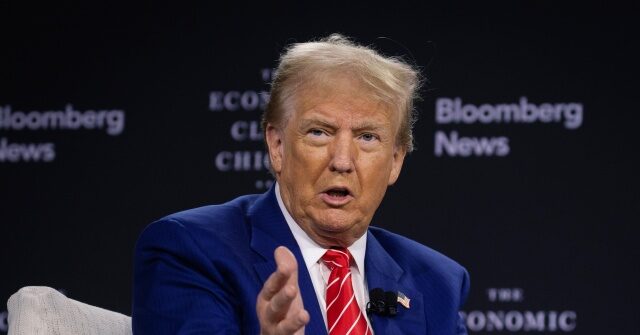In a recent statement, former President Donald Trump expressed his dire concerns about the future of the U.S. auto industry, claiming that it faces imminent threats from outsourcing to Mexico, particularly in light of the upcoming presidential election featuring Vice President Kamala Harris. Trump asserted that if Harris were to win, significant automotive manufacturing would shift to Mexico, undermining American factories. He highlighted the scale of these Mexican factories, characterizing them as the largest automotive plants ever built, which he believes could ultimately jeopardize the American economy. Trump’s rhetoric underscores his ongoing belief that free trade agreements have damaged domestic industries, particularly in sectors like automotive manufacturing.
During a panel discussion at the Economic Club of Chicago, Trump recounted a meeting with an auto executive who previously considered touring production facilities in the U.S. The executive expressed intentions to relocate large factories to Mexico, primarily to export vehicles to the U.S. without incurring tariffs. Trump’s commentary evolved from lamenting industrial outsourcing to suggesting that changes in strategy were being contemplated by automotive manufacturers in response to his potential electoral success. He indicated that these companies were deferring their plans for Mexican factories due to a belief that he poses a formidable threat to their operations if elected.
Central to Trump’s campaign narrative is his commitment to imposing substantial tariffs on foreign imports, particularly cars made in Mexico. He emphasized his willingness to enact what he described as “the highest tariff in history,” asserting that such measures would effectively protect American jobs and prevent the decline of the domestic auto industry. He insisted that he would not allow cars produced abroad, especially by Chinese companies establishing factories in Mexico, to flood the U.S. market. This position is a striking contrast to Harris, who has advocated for free trade and criticized Trump’s tariff plans as harmful to global trade relations and the economy.
Trump’s remarks reflect broader concerns he has voiced about the competitive edge foreign automakers, particularly from China, may gain through strategic production in Mexico. He warned that these companies are poised to exploit advantageous conditions near the U.S. border, which would further endanger jobs in traditional automotive hubs like Michigan and South Carolina. Trump framed his trade policies as essential to securing American industry from international competition, utilizing a stark dichotomy of protecting American workers against what he refers to as predatory foreign practices.
In contrast, Kamala Harris and her economic team, including billionaire Mark Cuban, have countered Trump’s narrative by advocating for policies that support free trade and emphasize the importance of international partnerships. They argue that his proposal for wide-ranging tariffs would potentially lead to increased prices for consumers, diminished economic growth, and strained diplomatic relations. Harris’s approach aims to position her administration as one that not only understands the complexities of global trade but also seeks to balance domestic interests with the realities of a connected global economy.
As the presidential campaign unfolds, the debate over trade policies and their implications for the American auto industry is likely to remain a focal point. Trump’s warnings of potential disaster should Harris win the election serve as a rallying cry for his supporters who prioritize job protection in the face of globalization. This stark division in policy perspectives encapsulates the broader ideological battle playing out in American politics, where economic strategies and their potential impacts on various sectors, particularly manufacturing, remain pivotal to voters’ decisions in the looming 2024 election.

